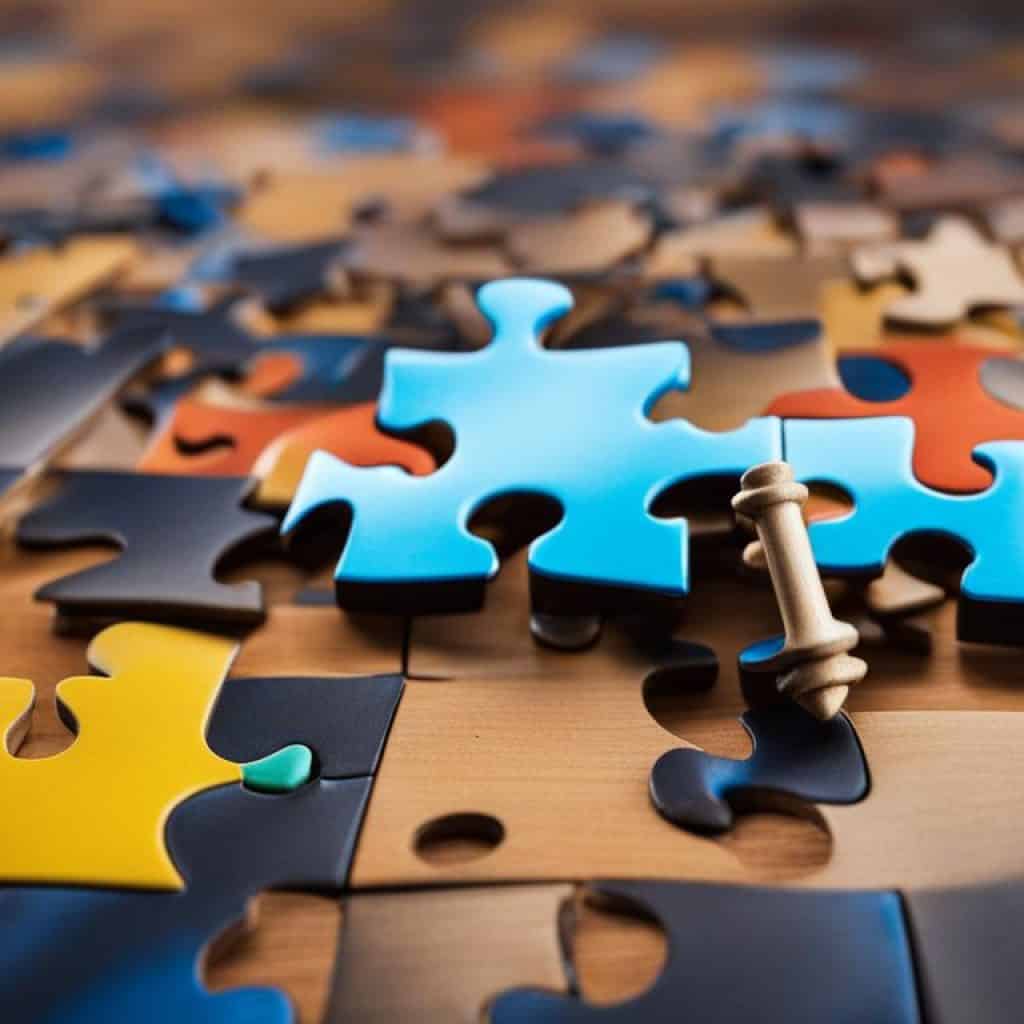Age gaps in relationships have been a topic of discussion for a long time. While some people consider it taboo to be in an age gap relationship, others believe that age is just a number. Whatever your opinion may be, it cannot be denied that relationships with significant age differences come with their own unique set of challenges and benefits. In this article, we will take a closer look at the pros and cons of 20-year age gap relationships and explore how you can navigate them successfully.
Key Takeaways:
- Age gaps in relationships can bring both benefits and challenges.
- Communication and understanding are key in navigating an age gap relationship.
- Societal judgments and stereotypes should not dictate the happiness of your relationship.
- Building trust and maintaining intimacy are crucial in a large age difference relationship.
- Real-life examples of successful age gap relationships can provide guidance and support.
The Pros and Cons of Age Gap Relationships: What You Need to Know
When it comes to age gap relationships, a 20-year age difference can bring a mix of benefits and challenges. Let’s explore the pros and cons of such relationships so you can make an informed decision about pursuing or maintaining one.
The Benefits of Age Gap Relationships
- Experience and Wisdom:
- Fresh Perspective and Energy:
- Learning and Growth:
The older partner in a 20-year age gap relationship has a wealth of life experience, wisdom, and knowledge to share with their younger counterpart. They may have a more established career, a broader network of contacts, and a deeper understanding of the world. This dynamic can lead to personal growth, guidance, and mentorship for the younger partner.
On the other hand, the younger partner can bring a fresh perspective, enthusiasm, and new energy into the relationship. They may be more open to trying new things, exploring different interests, and embracing change. This can inject a sense of adventure and excitement into the partnership.
Both partners in an age gap relationship have the opportunity to learn from each other. The older partner can gain a renewed sense of vitality and curiosity, while the younger partner can benefit from the wisdom and life experiences of their older counterpart. This mutual learning and growth can lead to personal development and a stronger bond.
The Challenges of Age Gap Relationships
- Communication Differences:
- Differing Interests:
One of the primary challenges in age gap relationships is navigating communication differences. Each partner may have different communication styles, priorities, and expectations shaped by generational factors. It’s important to establish open and honest communication, actively listen to each other, and find common ground to overcome potential misunderstandings and conflicts.
With a significant age difference, partners may have different interests and hobbies. Finding common ground and shared activities can be a challenge. However, embracing each other’s unique passions, exploring new interests together, and maintaining independent interests can help create a balanced and fulfilling relationship.
Despite the challenges, age gap relationships can thrive when both partners are committed, respectful, and willing to work through obstacles. Remember, every relationship is unique, and it’s important to prioritize open communication, understanding, and compromise to create a fulfilling connection.
The Psychological Implications of Dating Someone Much Older or Younger
While 20-year age gap relationships can come with their own set of challenges, it’s important to also consider the psychological implications for both partners involved. Such relationships can trigger various emotions and experiences that may impact the individualsâ well-being and the dynamics of their relationship.
For the younger partner, dating someone much older can evoke feelings of inadequacy and insecurity. They may worry about not being taken seriously or fear that they will never be able to truly understand their partner’s life experiences. This can lead to a sense of self-doubt and uncertainty.
On the other hand, the older partner may feel the pressure to keep up with the youthful energy and demands of their younger counterpart. They may fear being perceived as old or worry about not being able to meet the expectations and desires of their younger partner. This can create exhaustion and a constant need to prove themselves.
Furthermore, an age difference in a relationship can contribute to a power imbalance. The older partner may have accumulated more life experience, financial stability, and social connections, which can naturally lead to them assuming a more dominating role in the relationship. This power dynamic can be challenging for the younger partner, who may feel a lack of agency and control over important decisions.
Additionally, family and social relationships can be significantly affected by an age gap. Family members and friends may harbor negative opinions about the relationship, disapprove of the age difference, or have concerns about the motives of both partners. These external judgments and criticisms can lead to isolation, strain on the relationship, and feelings of being misunderstood.
“Age does not protect you from love, but love, to some extent, protects you from age.” – Jeanne Moreau
It’s crucial for both partners to actively address and navigate these psychological implications to ensure a healthy and fulfilling relationship. Open communication, mutual understanding, and empathy are key to fostering a supportive and balanced partnership that acknowledges the unique challenges an age gap relationship may bring.
| Psychological Implications | Effects |
|---|---|
| Feelings of inadequacy and insecurity | Increased self-doubt and uncertainty |
| Pressure to keep up with younger partner | Exhaustion and constant need to prove oneself |
| Power imbalance | Younger partner feeling a lack of agency and control |
| Impact on family and social relationships | Isolation, strain, and feeling misunderstood |
Despite these challenges, it’s important to remember that age gap relationships can also thrive with understanding, respect, and patience. By acknowledging and addressing the psychological implications, both partners can work together to build a strong foundation and navigate the unique dynamics of their relationship.
How to Navigate an Age Gap Relationship Without Losing Your Identity
In any relationship, it is essential to maintain your individuality and not lose yourself in the process. This is especially true in age gap relationships, where the partners may be at different stages of their lives. It is crucial to set boundaries and discuss your needs and goals with your partner regularly. This can help avoid the feeling of losing your identity and keep the relationship healthy and balanced.
Age gap relationships often face societal judgment and criticism due to the significant age difference. However, it is important to remember that love knows no age, and the opinions of others should not dictate the happiness of your relationship. By staying true to yourself, your partner, and your values, you can navigate an age gap relationship successfully while maintaining your identity.
Navigating Age Gap Relationship Challenges
Age gap relationships can present unique challenges that require open and effective communication. It is essential to have honest conversations with your partner about potential challenges and how you both plan to address them. By working together as a team, you can navigate the hurdles that come with an age gap relationship.
Communication is key in any relationship, and it becomes even more important in age gap relationships. It is vital to understand each other’s needs, expectations, and concerns. By openly discussing your feelings and thoughts, you can build trust, strengthen your bond, and find common ground.
Building a Support System
Having a strong support system is crucial when navigating an age gap relationship. Surround yourself with friends and family who are accepting and supportive of your relationship. Seek advice and guidance from others who have been in similar situations. Connecting with couples in successful age gap relationships can provide valuable insights and reassurance.
Furthermore, consider seeking professional help, such as couples therapy or relationship counseling. A qualified therapist can assist you in addressing any challenges and offer guidance on maintaining your identity while fostering a healthy connection with your partner.
Embracing Your Individuality
Maintaining your individuality is key to a flourishing age gap relationship. Remember that you are more than just the age difference between you and your partner. Embrace your unique interests, hobbies, and personal goals. It is essential to have separate identities while also nurturing a strong bond as a couple.
Maintaining a sense of independence allows you to continue growing as an individual and brings added richness to the relationship. Encourage each other to pursue personal passions and support one another’s endeavors.
Addressing Societal Judgment
Societal judgment is an unfortunate reality for many age gap couples. However, it is important to rise above the opinions of others and stay true to yourself and your relationship. Surround yourself with a supportive network and focus on the positive aspects of your partnership.
Remember, the key to navigating societal judgment is to be secure in your relationship and confident in your love for each other. By educating others about the depth and authenticity of your connection, you can challenge stereotypes and promote understanding and acceptance.
The Power of Open Communication
Effective communication is crucial for any relationship, but it becomes even more vital in age gap relationships. Discuss your expectations, fears, and concerns openly with your partner. By having open conversations, you can address any potential power imbalances and ensure that both partners have an equal voice in decision-making processes.
Additionally, actively listen to your partner and validate their feelings and experiences. This fosters understanding and strengthens your emotional connection. Remember that navigating an age gap relationship requires ongoing communication and a commitment to mutual growth and understanding.

The Impact of Age Differences on Communication and Conflict Resolution
Age differences in relationships can present unique challenges when it comes to communication and conflict resolution. Understanding and navigating these challenges is essential for maintaining a healthy and successful relationship.
One of the primary communication challenges in age gap relationships is the different perspectives and life experiences that each partner brings to the table. It’s important to recognize that age differences can shape how individuals view situations and communicate their thoughts and feelings. Each partner needs to be heard, understood, and respected to foster effective communication.
“Communication – the human connection – is the key to personal and career success.” – Paul J. Meyer
Conflict resolution can also be more complicated in age gap relationships. The diverse perspectives and experiences can lead to misunderstandings, clashes of priorities, and misaligned expectations. It’s crucial to approach conflict with empathy, patience, and a willingness to find common ground. Open and honest communication is the foundation for resolving conflicts in a healthy and constructive manner.
“In the middle of difficulty lies opportunity.” – Albert Einstein
Societal stigma can also impact communication and conflict resolution in age gap relationships. Older partners may face criticism and judgment from friends, family, and society due to the age difference. It’s important to support and uplift each other, creating a safe space where open dialogue can flourish despite external opinions.
In addition, age differences within relationships can create a power dynamic where the older partner may have more control. Acknowledging and addressing this power dynamic is crucial for maintaining equality and balance in the relationship. Both partners should have equal say in decision-making, ensuring that neither feels overshadowed or unheard.
To summarize:
| Challenges | Impact |
|---|---|
| Communication | Different perspectives and experiences may lead to misunderstandings and misaligned expectations. |
| Conflict Resolution | Diverse viewpoints and priorities can make finding common ground more challenging. |
| Societal Stigma | Judgment from friends, family, and society can create tension and strain. |
| Power Dynamic | The older partner may have more control, requiring balance and equal decision-making. |
Navigating the impact of age differences on communication and conflict resolution requires open-mindedness, empathy, and a commitment to understanding and respecting each other’s perspectives. By prioritizing effective communication, addressing conflicts constructively, and supporting each other through societal challenges, age gap relationships can thrive and grow stronger.
The Role of Cultural and Societal Norms in Age Gap Relationships
While we live in a more accepting and progressive society today, cultural and societal norms can still have an impact on age gap relationships. These norms can vary widely between different cultures and communities, influencing how age gap relationships are perceived and accepted.
“Culture does not make people. People make culture. If it is true that the full humanity of women is not our culture, then we can and must make it our culture.”
– Chimamanda Ngozi Adichie
Some cultures may be more accepting of age gap relationships, recognizing love and connection as the defining factors in a partnership rather than age. These cultures may have a more open-minded and inclusive view of relationships that span significant age differences. Conversely, other cultures may retain more conservative views, frowning upon age gap relationships and creating challenges for those involved.
It is important to understand and respect the cultural norms of your partner and their community when navigating an age gap relationship. This understanding allows for open and honest communication about expectations, boundaries, and potential challenges that may arise as a result of these cultural differences.
Age gap relationships can also face unique challenges when it comes to life stages and goals. Partners with a significant age difference may be in different stages of their lives, facing different societal expectations, and having different personal goals and priorities.
It is crucial to have open conversations about these differences and work together to find a balance that accommodates both partners’ needs and aspirations. This may involve compromises and adjustments, ensuring that each person’s individual goals and growth are supported within the context of the relationship.
“Love is not about the age; it’s about how you identify with one another. If you connect, you connect.”
– Demi Moore
Overcoming negative stereotypes and judgments about age gap relationships can be another significant challenge. People may harbor preconceived notions about the motivations and dynamics of these relationships, making assumptions based on societal norms and expectations.
It is important to educate others about the depth and authenticity of your relationship, challenging these stereotypes and promoting understanding and acceptance. Surrounding yourself with a supportive network of friends, family, and mentors who embrace and respect your choices can also provide the necessary strength and encouragement to navigate the complexities of an age gap relationship.

By acknowledging and respecting cultural norms, engaging in open communication, and seeking support from like-minded individuals, age gap relationships can thrive and flourish, defying societal expectations. Love knows no age limits, and with understanding, acceptance, and genuine connection, age differences can become insignificant in the grandeur of a fulfilling and lasting relationship.
Tips for Building Trust and Maintaining Intimacy in a Large Age Difference Relationship
Trust and intimacy are the foundation of any successful relationship. In a large age difference relationship, these elements become even more crucial. Here are some valuable tips to help you build trust and maintain intimacy:
1. Open and Honest Communication: Ensure that both partners have a safe space to express their thoughts, feelings, and concerns. Encourage open dialogue about expectations, boundaries, and any insecurities related to the age difference. This level of communication fosters trust and understanding.
2. Mutual Respect: Treat each other with respect and value each other’s perspectives. Acknowledge that both partners bring unique strengths and experiences to the relationship. Embrace the diversity that comes with the age difference and appreciate the wisdom and vitality each partner offers.
3. Commitment to the Relationship: A strong commitment is essential in overcoming the potential power imbalance that may arise due to the age difference. Demonstrate your dedication through consistent actions that prioritize the relationship’s well-being. Show up for each other and make the necessary effort to nurture the connection.
4. Create Space for Intimate Conversations: Intimacy goes beyond physical connection. It is about emotional closeness and vulnerability. Set aside quality time to engage in deep conversations, share dreams, fears, and most importantly, actively listen to each other. This creates a sense of trust and fosters a stronger bond.
5. Embrace Shared Interests: Find activities, hobbies, or interests that you both enjoy. Engaging in shared experiences strengthens the connection and promotes a sense of unity. These shared interests can bridge the age difference and provide avenues for deeper emotional connection.
6. Prioritize Personal and Relationship Growth: Encourage each other’s personal growth and support individual goals and aspirations. Foster an environment that allows both partners to thrive intellectually, emotionally, and professionally. This promotes a sense of mutual support and trust.
7. Seek Professional Help If Needed: If you’re finding it challenging to navigate trust or intimacy issues in your age difference relationship, consider seeking guidance from a relationship counselor or therapist. A professional can provide valuable insights and strategies tailored to your unique circumstances.
By implementing these tips, you can build a solid foundation of trust and maintain a deep sense of intimacy in your large age difference relationship.
Overcoming Negative Stereotypes and Judgments About Age Gap Relationships
Being in a 20-year age gap relationship often comes with significant challenges, including negative stereotypes and judgments from others. People may make assumptions about the motives and dynamics of the relationship, leading to criticism and misunderstanding.
It is important to ignore these stereotypes and not let them affect your relationship.
One effective way to overcome these negative stereotypes and judgments is to build a strong support system. Seek support from friends, family, and therapists who understand and support your relationship. Surrounding yourself with a supportive network can provide the emotional strength and encouragement needed to navigate the challenges that come with age gap relationships.
Sharing your story and educating others about the depth and authenticity of your relationship can also help challenge stereotypes and promote understanding and acceptance.
Remember, love knows no age limits, and the happiness and strength of your relationship should not be defined by societal opinions.
By defying these stereotypes and judgment, you can focus on nurturing your relationship and creating a loving bond that transcends age differences.

In the next section, we will explore valuable tips for making your age gap relationship work and thrive.
Tips for Making the Relationship Work
Maintaining a successful 20-year age gap relationship requires effort and commitment from both partners. Here are some tips to help navigate the unique challenges and build a strong, loving bond:
- Open and honest communication: Effective communication is key to understanding each other’s needs, desires, and concerns. Create a safe space for open conversations, actively listen to each other, and express yourselves honestly.
- Willingness to compromise: Recognize that compromise is essential in any relationship. Find common ground when facing differences and be open to finding solutions that meet both partners’ needs.
- Maintain a sense of humor: Laughter can help lighten the mood and alleviate tension. Embrace humor in your relationship and find joy in each other’s company.
- Focus on shared values and interests: Identify shared values and interests that can strengthen your connection. Engage in activities together that you both enjoy and support each other’s passions.
- Set goals together: Collaborate on setting short-term and long-term goals as a couple. This can give you a sense of purpose and direction, fostering a deeper sense of commitment and shared vision.
- Give each other space: Respect each other’s need for personal time and individual growth. Encourage each other to pursue personal interests and maintain a healthy sense of independence.
- Support individual growth and development: Encourage and support each other’s personal growth and individual aspirations. Celebrate each other’s achievements and continue to learn and evolve together.
By prioritizing open communication, compromise, and a positive mindset, you can overcome the challenges that come with a significant age gap and build a lasting, fulfilling relationship.
Real-Life Examples of Successful Age Gap Relationships
One of the best ways to gain insights into successful age gap relationships is by exploring real-life examples. These stories of individuals who have navigated significant age differences can provide valuable lessons and inspiration for those in similar relationships. From celebrities to everyday people, there are countless examples of couples who have built lasting and fulfilling relationships despite their age gaps.
For instance, consider the relationship between George Clooney and Amal Alamuddin. With a 17-year age difference, the couple proves that love transcends age. Their shared values, mutual respect, and commitment to their careers and philanthropy have helped them build a strong bond that stands the test of time. Their story serves as a reminder that age should not limit one’s ability to find happiness and fulfillment in a relationship.
Another inspiring example is that of Catherine Zeta-Jones and Michael Douglas. Despite their 25-year age difference, the couple has been married for over two decades. Their enduring love story showcases the importance of effective communication, understanding, and a shared commitment to their family. They have overcome challenges and emerged stronger as a couple, proving that age gaps can be navigated successfully with the right foundation.
These real-life examples demonstrate that age is just a number and that successful age gap relationships are possible. While every relationship is unique and faces its own set of challenges, the experiences of these couples can offer guidance and support.
“Love doesn’t ask for age; it insists on being shared.” – Ethan Hawke
Lessons from Real-Life Examples
When examining successful age gap relationships, several common themes emerge:
- Shared values and goals: Couples who align their values and aspirations are more likely to navigate age differences successfully. Having a shared vision for the future helps create a sense of unity and purpose.
- Effective communication: Open and honest communication is essential in any relationship but becomes even more crucial in age gap relationships. Regularly discussing expectations, concerns, and desires can foster understanding and prevent misunderstandings.
- Mutual respect: Respecting each other’s individuality and experiences is vital in age gap relationships. Recognizing the value that each partner brings to the relationship fosters mutual admiration and strengthens the bond.
- Supportive networks: Building a strong support system of friends, family, and mentors who understand and respect the relationship can provide invaluable emotional support and guidance.
By embracing these lessons and learning from the experiences of others, individuals in age gap relationships can navigate the challenges and cultivate a healthy, fulfilling partnership.
Conclusion
In conclusion, successfully navigating a 20-year age gap relationship requires open communication, mutual respect, and a willingness to face the unique challenges and benefits that come along with it. Despite societal judgments and negative stereotypes, staying true to yourself and your relationship is key in overcoming these obstacles. By focusing on shared values, maintaining individual identities, and prioritizing trust and intimacy, you can build a strong and loving bond that defies age differences.
It’s important to remember that love knows no age limits, and with effort and commitment, you can create a fulfilling and lasting relationship. Embrace the diversity of experiences that both partners bring, learn from each other, and find common ground to strengthen your connection. By nurturing a supportive and understanding environment, you can thrive together.
While age gap relationships may present communication and power dynamic challenges, by actively working on understanding and compromising, you can overcome these hurdles. Don’t let societal norms dictate the happiness of your relationship. Surround yourselves with a supportive network of friends, family, or therapists who understand and respect your choices. Share your story to challenge stereotypes and promote acceptance.
In summary, a successful 20-year age gap relationship requires patience, understanding, and a commitment to growth. By embracing the uniqueness of your connection, focusing on effective communication, maintaining your individuality, and building trust and intimacy, you can create a love that defies age and transcends societal expectations. Embrace the journey, navigate the challenges, and celebrate the love that knows no age limits.
FAQ
What are the benefits and challenges of being in a 20-year age gap relationship?
Age gap relationships can bring diversity of experiences and perspectives, but they can also present challenges such as communication differences and differing interests.
What are the psychological implications of dating someone much older or younger?
The younger partner may experience insecurity and the fear of not being taken seriously, while the older partner may feel the pressure to keep up. Power imbalances and strain on family and social relationships can also be psychological impacts.
How can I maintain my identity in an age gap relationship?
Setting boundaries, discussing needs and goals, and prioritizing open communication can help you maintain your identity and keep the relationship balanced.
How do age differences affect communication and conflict resolution in a relationship?
Age differences can lead to different communication styles and priorities, making conflict resolution more complicated. The power dynamic within the relationship can also affect communication and decision-making.
What role do cultural and societal norms play in age gap relationships?
Cultural and societal norms can impact the acceptance of age gap relationships. It’s important to understand and respect the norms of your partner’s community and have open communication about your differences and goals.
How can I build trust and maintain intimacy in a large age difference relationship?
Trust can be built through open communication, mutual respect, and a commitment to the relationship. Creating a space for open and intimate conversations is important for building intimacy.
How can I overcome negative stereotypes and judgments about age gap relationships?
Seeking support from a strong support system, sharing your story, and educating others about your relationship can help challenge stereotypes and promote understanding and acceptance.
What are some tips for making a 20-year age gap relationship work?
Prioritizing open communication, compromising, focusing on shared values, and setting goals together are important tips for making the relationship work.
Are there any real-life examples of successful age gap relationships?
Yes, there are many couples who have successfully navigated significant age differences and built lasting relationships. Learning from their experiences can provide guidance and inspiration for your own relationship.








Add comment